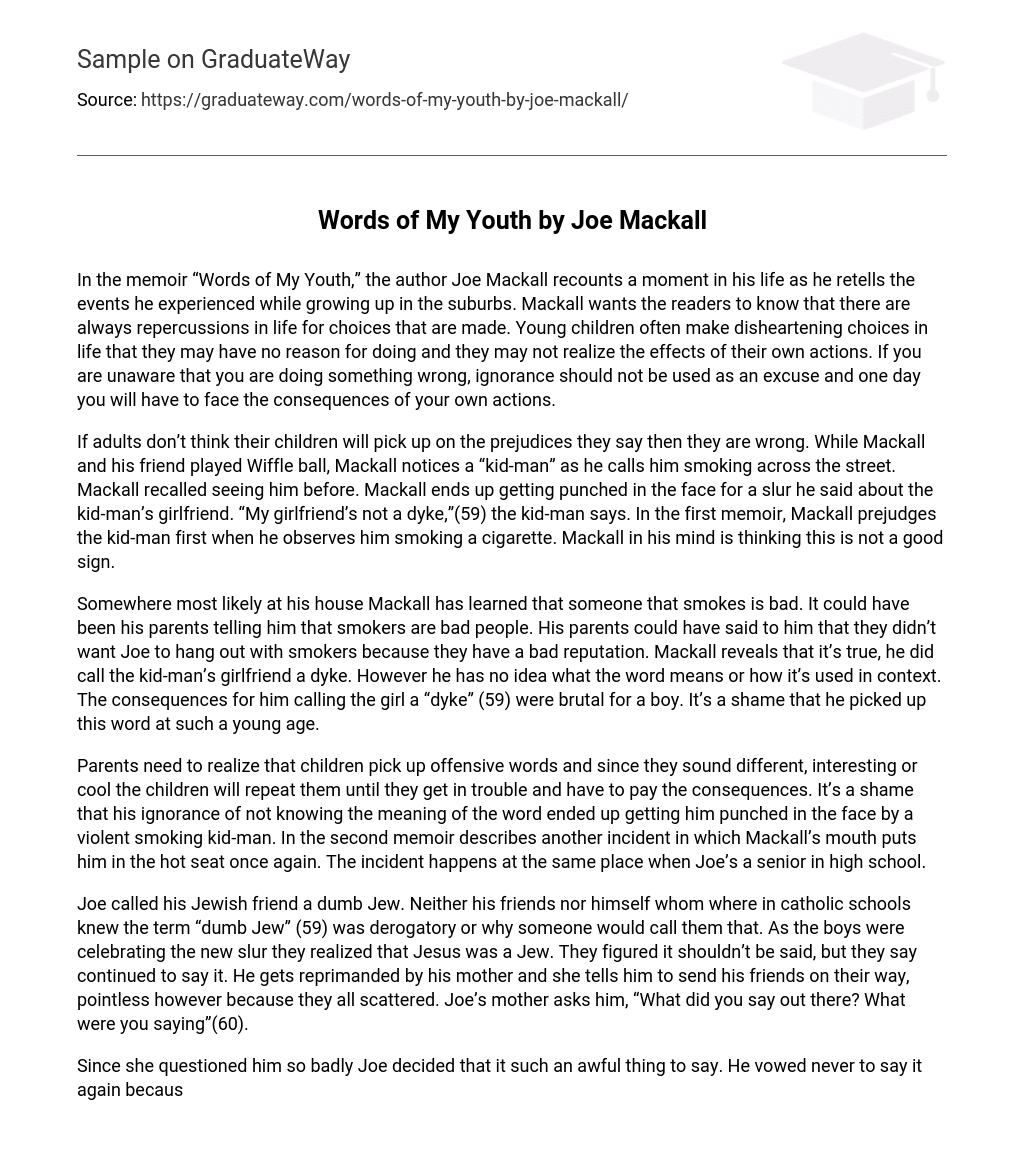In the memoir “Words of My Youth,” the author Joe Mackall recounts a moment in his life as he retells the events he experienced while growing up in the suburbs. Mackall wants the readers to know that there are always repercussions in life for choices that are made. Young children often make disheartening choices in life that they may have no reason for doing and they may not realize the effects of their own actions. If you are unaware that you are doing something wrong, ignorance should not be used as an excuse and one day you will have to face the consequences of your own actions.
If adults don’t think their children will pick up on the prejudices they say then they are wrong. While Mackall and his friend played Wiffle ball, Mackall notices a “kid-man” as he calls him smoking across the street. Mackall recalled seeing him before. Mackall ends up getting punched in the face for a slur he said about the kid-man’s girlfriend. “My girlfriend’s not a dyke,”(59) the kid-man says. In the first memoir, Mackall prejudges the kid-man first when he observes him smoking a cigarette. Mackall in his mind is thinking this is not a good sign.
Somewhere most likely at his house Mackall has learned that someone that smokes is bad. It could have been his parents telling him that smokers are bad people. His parents could have said to him that they didn’t want Joe to hang out with smokers because they have a bad reputation. Mackall reveals that it’s true, he did call the kid-man’s girlfriend a dyke. However he has no idea what the word means or how it’s used in context. The consequences for him calling the girl a “dyke” (59) were brutal for a boy. It’s a shame that he picked up this word at such a young age.
Parents need to realize that children pick up offensive words and since they sound different, interesting or cool the children will repeat them until they get in trouble and have to pay the consequences. It’s a shame that his ignorance of not knowing the meaning of the word ended up getting him punched in the face by a violent smoking kid-man. In the second memoir describes another incident in which Mackall’s mouth puts him in the hot seat once again. The incident happens at the same place when Joe’s a senior in high school.
Joe called his Jewish friend a dumb Jew. Neither his friends nor himself whom where in catholic schools knew the term “dumb Jew” (59) was derogatory or why someone would call them that. As the boys were celebrating the new slur they realized that Jesus was a Jew. They figured it shouldn’t be said, but they say continued to say it. He gets reprimanded by his mother and she tells him to send his friends on their way, pointless however because they all scattered. Joe’s mother asks him, “What did you say out there? What were you saying”(60).
Since she questioned him so badly Joe decided that it such an awful thing to say. He vowed never to say it again because if his mother didn’t think it was an appropriate slur to say then most likely nobody would want to hear it. When a person offensively calls people names such as dumb blonde, it happens so quick that sometimes the person doesn’t even realize what they are saying. Derogatory slurs sometimes just roll off your tongue. Then she follows on by asking “Where did you ever hear a thing like that? That kind of talk? “ (60). Mackall closes the story while lying on the metaphors.
He relates with himself not knowing where he learned the slurs, to not knowing how a Wiffle ball will behave once caught by the wind. Not knowing the direction of the Wiffle ball reflects to life because the certainty of where it may take you, you may never know. Parents need not only to protect and guard their minds but the minds of youth also especially with all the wickedness in the world. Works Cited Mackall, Joe. “Words of My Youth. ” Writing Today. Richard Johnson-Sheehan and Charles Paine. 2nd ed. Boston: Pearson 2010. 59-60.





